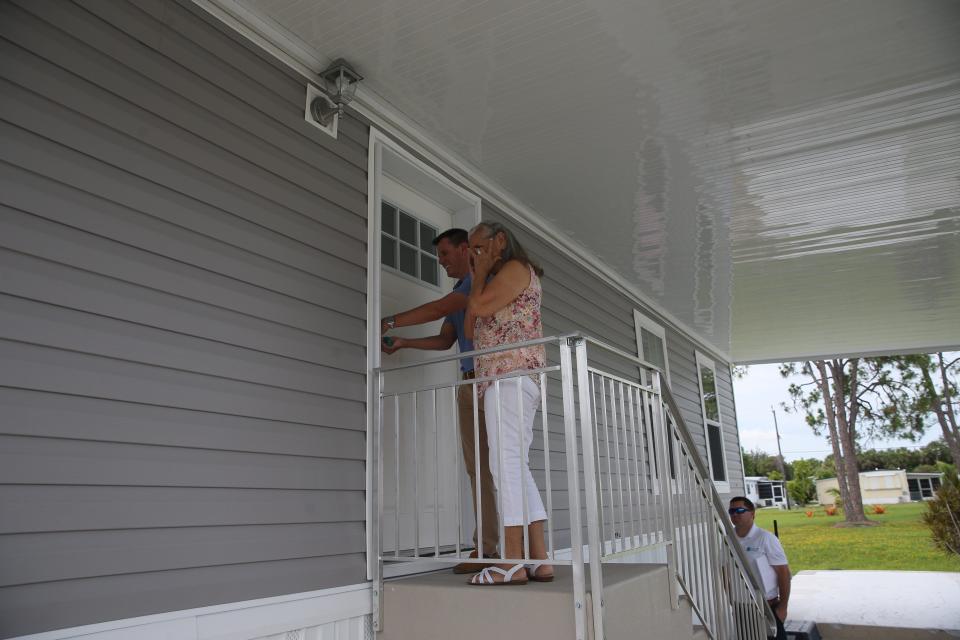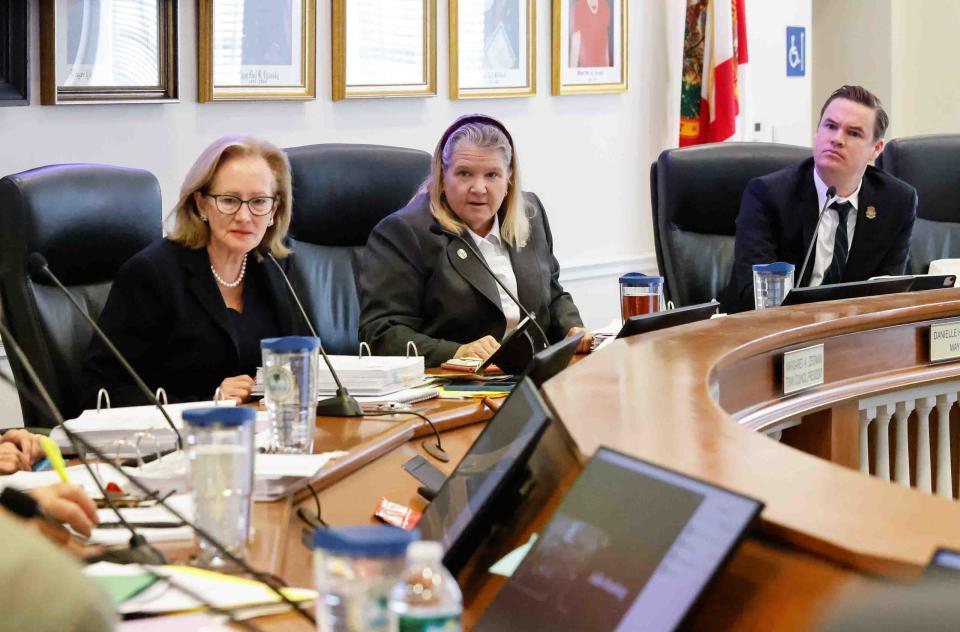DeSantis signs bill to improve hurricane response, but it impacts home rule
- Oops!Something went wrong.Please try again later.
The governor has quietly signed a bill that some local leaders view as another threat to home rule in Florida.
On Thursday, Gov. Ron DeSantis signed off on Senate Bill 250, dubbed "Natural Emergencies" and sponsored by Sen. Jonathan Martin, R-Fort Myers.
While it includes many beneficial measures designed to help communities recover from Hurricane Ian and become more resilient against future storms, it will temporarily restrict local land use decisions – and could even undo decisions made by local governments since the hurricane in parts of the state.
The state prohibition on more restrictive and burdensome rules reaches back to Sept. 28, the day Ian hit, applying to every locality within 100 miles of where the destructive hurricane made landfall.
It similarly applies to areas impacted by Hurricane Nicole, which made landfall near Vero Beach in November.
Even before its signing, the bill sparked some concerns among local leaders in places such as Naples and Palm Beach.

The Senate unanimously approved the legislation on May 1, which includes a retroactive prohibition on adopting any harsher regulations. It would essentially render them "null and void."
Applicable proposals or actions taken by a town, city or county would be wiped out, requiring them to start all over again on adopting those changes – after the prohibition expires in September 2024.
Since Ian, Naples City Council has adopted several text amendments that could be overturned by the bill.
Land use decision delayed in Naples
A few weeks ago, Naples City Council pushed off decisions on several proposed code changes due to the legislation, with the expectation that it would become law.
At the time, Council only moved forward with one of four proposals, approving it unanimously and setting a second hearing for August, after summer recess – until it knew the fate of Senate Bill 250 for certain. That proposed change would create new rules for outdoor dining on public property, including charging a yet-to-be determined fee for its use and requiring an 8-foot, instead of a 5-foot clearance, or path, for passersby.
The majority of councilors felt they had more leeway on such a change because it didn't involve private property, and it didn't seem to face much opposition either.
The three proposals City Council continued or rescheduled to another day would:
Reinstate density limits on hotels, motels and other lodging
Require conditional use approval for additional recreational uses in residential districts
Impose new parking requirements for outdoor dining on Fifth Avenue South
"We expected that SB 250 would eventually become law. An analysis of this bill and its preemption language has begun," said City Manager Jay Boodheshwar.

Naples councilman: 'Enough is enough'
At a City Council meeting in May, Vice Mayor Mike McCabe railed against the legislation, describing it as another "state overreach."
"This is enough," he lamented. "Our public, our community, our residents should be outraged. They should reach out to the state and they should call the governor and they should say, 'home rule is the best rule.'"
More: State legislation could undo land use changes made in Naples since Hurricane Ian
In a different part of Collier County, the legislation has put the brakes on the finalization of the long-anticipated U.S. 41 East Zoning Overlay, which would establish much more stringent design and development standards in East Naples, discouraging "undesirable uses," such as self-storage and car storage, that have proliferated over the last decade. The county expected to implement the zoning overlay this year, but it's in direct conflict with SB 250.
"Our hands are tied," Mike Bosi, the county's planning and zoning director, informed Collier commissioners at a recent board meeting.
Palm Beach sees unexpected impact
The town of Palm Beach, sitting roughly 80 miles to the south of Hurricane Nicole’s landfall at North Hutchinson Island, didn't see much damage from the storm. Yet, it's still impacted by the new law.
More: Construction 'pause' pulled amid conflict with new state legislation
For more than a year, the town has worked with consultants to overhaul its outdated zoning codes, which have been criticized as inconsistent and confusing.
In May, Council decided to hold off on declaring a zoning-in-progress, which would have put a six-month pause on some residential projects, while it worked toward implementing new development rules. After hearing as much from the town attorney, councilors determined it would have been at odds with SB 250.
Council members raised several concerns with the then-pending bill, with some calling it ambiguous, arbitrary and overly broad.
At the time, Councilwoman Julie Araskog, said: "I feel this has really taken our home rule away. It’s very disappointing, and it’s very discouraging, and in my opinion unfair.”

The bill did not face widespread opposition, with many city, town and county managers around the state seeing its pros far outweighing its cons. The Florida League of Cities, the voice for local government in the state, didn't take a stand on it.
What else is in the new law?
The bill incorporated the recommendations of the Select Committee on Resiliency, created by Senate President Kathleen Passidomo, R-Naples. That includes:
Requiring the Florida Department of Emergency Management to post a model debris removal contract for local governments on its website.
Encouraging local governments to create emergency financial plans in preparation for major natural disasters.
Requiring cities and counties to allow residents to live in trailers or recreational vehicles on their property for up to three years after a hurricane.
Authorizing local governments to create specialized building inspection teams to review and expedite permits for temporary housing following a disaster.
Requiring local governments to expedite the issuance of permits after a storm.
Increasing the extension of certain building permits following the declaration of a state of emergency from six to 24 months, or up to four years in the case of multiple natural disasters.
The legislation also contained $62 million in funding and spending authority, including $11 million for local government hazard mitigation projects and another $50 million for a Local Government Emergency Bridge Loan Program – doubling the amount available to help with recovery.
Palm Beach Daily News reporter Jodie Wagner contributed to this story.
This article originally appeared on Naples Daily News: New Florida law to help with hurricane recovery, could hurt home rule

